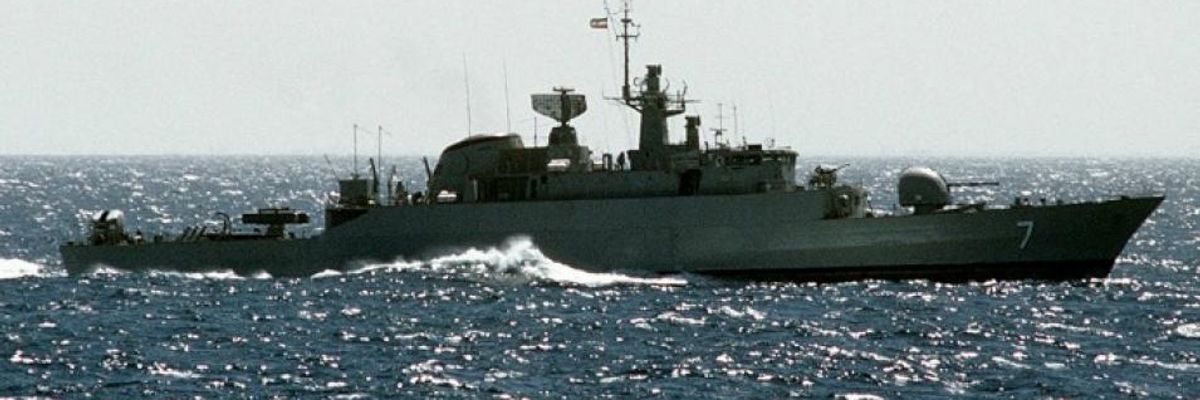

SUBSCRIBE TO OUR FREE NEWSLETTER
Daily news & progressive opinion—funded by the people, not the corporations—delivered straight to your inbox.
5
#000000
#FFFFFF
To donate by check, phone, or other method, see our More Ways to Give page.


Daily news & progressive opinion—funded by the people, not the corporations—delivered straight to your inbox.

Iran's Alvand warship, one of two reportedly deployed on Thursday. (Photo: ThereAreNoSunglasses.wordpress.com)
Iran reportedly sent two warships to the Gulf of Aden on Thursday, following news of the first-ever U.S. cruise missile strikes on Iran-backed Houthis late Wednesday.
The republic's naval commander confirmed that two naval destroyers had been deployed off the Yemeni coast "to protect trade vessels," as the semi-official Tasnim news agency reported.
RT reports that the commander, Rear Admiral Habibollah Sayyari, "dismissed claims the fleet has been deployed to intervene in the conflict in Yemen."
But given that "[m]any see the Yemen conflict as a proxy war between the Middle East's two main rivals, Saudi Arabia and Iran, and their western or regional backers," as the Guardian put it on Thursday, the latest development could further ratchet up tensions in the region.
Indeed, Stephen Seche, who served as the U.S. ambassador to Yemen from 2007 to 2010, told the newspaper in response to the U.S. escalation: "It's not at all a stretch of the imagination, to my mind, that the Iranians benefit from seeing the U.S. drawn into this."
But Peter Cook, the Pentagon press secretary, on Thursday said that despite the missile attacks on Yemen, the U.S. military is not interested in expanding its involvement in the war.
"We don't seek a wider role in this conflict," Cook said, claiming the strikes were a limited reprisal to defend the USS Mason and freedom of navigation in the Bab al-Mandeb waterway, "not connected to the broader conflict in Yemen."
Donald Trump’s attacks on democracy, justice, and a free press are escalating — putting everything we stand for at risk. We believe a better world is possible, but we can’t get there without your support. Common Dreams stands apart. We answer only to you — our readers, activists, and changemakers — not to billionaires or corporations. Our independence allows us to cover the vital stories that others won’t, spotlighting movements for peace, equality, and human rights. Right now, our work faces unprecedented challenges. Misinformation is spreading, journalists are under attack, and financial pressures are mounting. As a reader-supported, nonprofit newsroom, your support is crucial to keep this journalism alive. Whatever you can give — $10, $25, or $100 — helps us stay strong and responsive when the world needs us most. Together, we’ll continue to build the independent, courageous journalism our movement relies on. Thank you for being part of this community. |
Iran reportedly sent two warships to the Gulf of Aden on Thursday, following news of the first-ever U.S. cruise missile strikes on Iran-backed Houthis late Wednesday.
The republic's naval commander confirmed that two naval destroyers had been deployed off the Yemeni coast "to protect trade vessels," as the semi-official Tasnim news agency reported.
RT reports that the commander, Rear Admiral Habibollah Sayyari, "dismissed claims the fleet has been deployed to intervene in the conflict in Yemen."
But given that "[m]any see the Yemen conflict as a proxy war between the Middle East's two main rivals, Saudi Arabia and Iran, and their western or regional backers," as the Guardian put it on Thursday, the latest development could further ratchet up tensions in the region.
Indeed, Stephen Seche, who served as the U.S. ambassador to Yemen from 2007 to 2010, told the newspaper in response to the U.S. escalation: "It's not at all a stretch of the imagination, to my mind, that the Iranians benefit from seeing the U.S. drawn into this."
But Peter Cook, the Pentagon press secretary, on Thursday said that despite the missile attacks on Yemen, the U.S. military is not interested in expanding its involvement in the war.
"We don't seek a wider role in this conflict," Cook said, claiming the strikes were a limited reprisal to defend the USS Mason and freedom of navigation in the Bab al-Mandeb waterway, "not connected to the broader conflict in Yemen."
Iran reportedly sent two warships to the Gulf of Aden on Thursday, following news of the first-ever U.S. cruise missile strikes on Iran-backed Houthis late Wednesday.
The republic's naval commander confirmed that two naval destroyers had been deployed off the Yemeni coast "to protect trade vessels," as the semi-official Tasnim news agency reported.
RT reports that the commander, Rear Admiral Habibollah Sayyari, "dismissed claims the fleet has been deployed to intervene in the conflict in Yemen."
But given that "[m]any see the Yemen conflict as a proxy war between the Middle East's two main rivals, Saudi Arabia and Iran, and their western or regional backers," as the Guardian put it on Thursday, the latest development could further ratchet up tensions in the region.
Indeed, Stephen Seche, who served as the U.S. ambassador to Yemen from 2007 to 2010, told the newspaper in response to the U.S. escalation: "It's not at all a stretch of the imagination, to my mind, that the Iranians benefit from seeing the U.S. drawn into this."
But Peter Cook, the Pentagon press secretary, on Thursday said that despite the missile attacks on Yemen, the U.S. military is not interested in expanding its involvement in the war.
"We don't seek a wider role in this conflict," Cook said, claiming the strikes were a limited reprisal to defend the USS Mason and freedom of navigation in the Bab al-Mandeb waterway, "not connected to the broader conflict in Yemen."